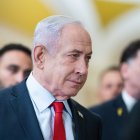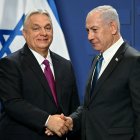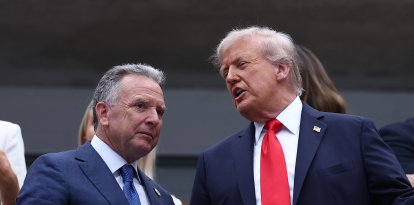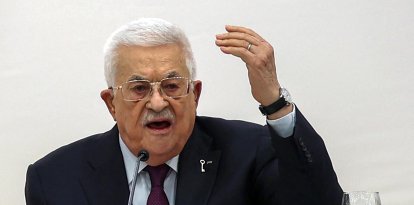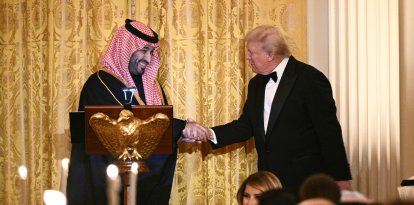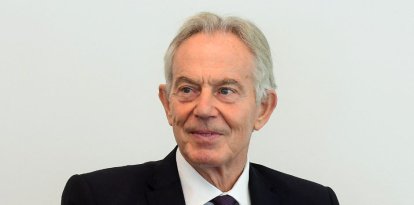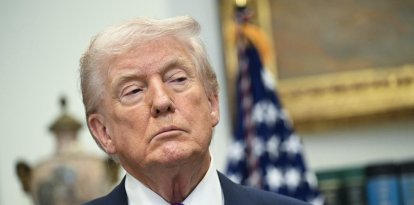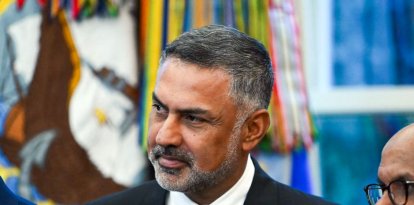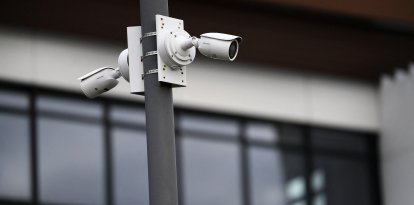Analysis
Shuttle diplomacy in action: Netanyahu’s quick pivot to Washington
Israel can provide a model to follow for other small to medium-sized economies faced with the economic fallout of America’s new tariffs. Many may be inspired by the PM’s conciliatory approach, including Donald Trump.

Israeli Prime Minister Benjamin Netanyahu with U.S. President Donald Trump (file photo)
On short notice last week, Israeli Prime Minister Benjamin Netanyahu announced a visit to Budapest, Hungary, for a visit with his closest European ally, Viktor Orbán.
Orbán rolled out the red carpet with a pomp and circumstance welcome, with Budapest’s famous bridges across the Danube lined with alternating Hungarian and Israeli flags. It is one of only a few locations Netanyahu could travel to safely and be welcomed in with open arms following the issuance of arrest warrants against him and former Israeli defense minister Yoav Gallant in November by the International Criminal Court.
By not having Netanyahu arrested, Orbán was defying the ICC and setting an example for other European nations. Orbán rewarded Netanyahu’s visit by further announcing that Hungary, a member of the European Union, would formally withdraw from the ICC, which Orbán said had turned from an “important institution” into a “political tool.”
ICC withdrawal: A model for other nations
Following Orbán’s dramatic announcement, Netanyahu thanked the Hungarian leader, and suggested that while Hungary was the first to withdraw it would likely “not be the last.” Netanyahu and his ally Orbán were setting a global model for other nations to follow.
The two also discussed expanding Israeli-Hungarian economic cooperation, particularly in the area of defense manufacturing, as Israel seeks to diversify its supply chains for basic munitions.
Israel’s beleaguered prime minister also received a much-needed short change of scenery. In addition to Orbán’s ICC announcement, Netanyahu was treated to a state dinner, a tour of the thriving Hungarian Jewish community including its grand Doheny Synagogue, and an unannounced river cruise along the Danube with his wife, Sara.
The break came amid the intensity of court testimony and domestic protests in Israel, while the Israeli premier simultaneously oversees a multifront war and negotiations for the return of Israel’s remaining 59 hostages (approximately 24 of whom are still believed to be alive).
Both the court cases, which would have ended in a mistrial long ago if held in the United States, as well as the protest movement, have been a constant over the past six years. Both are organized by a group of leftist elites who claim to be saving Israel’s democracy yet find themselves losing power to the “tyranny of the majority,” aka the Israeli electorate, who have repeatedly voted for right-wing governments and are tired of the left’s progressive policies on security and social issues.
A new trade deal with America
Just as Netanyahu’s trip to Hungary was nearing conclusion, there was another dramatic announcement: Netanyahu would extend the short diplomatic mission into a more consequential shuttle diplomacy tour.
Not only was Netanyahu the first world leader to meet U.S. President Donald Trump in the White House, barely two weeks after his second inauguration in early February, he will now be the first leader to meet Trump twice.
More importantly, he will be the first leader to meet Trump face-to-face since the U.S. administration’s announcement of stiff reciprocal tariffs on nations around the world, including Israel. Israel is now threatened with a 17% tariffs on exports to the U.S. Barely 24 hours ahead of the Trump tariff announcement, Israel’s Finance Ministry announced that it would cancel all tariffs on U.S. goods. Apparently, the Trump administration did not receive the memo.
Netanyahu raised the issue in a call with Trump, and the U.S. president offered to discuss the issue in person. Israel’s leader hopes to negotiate an improved reciprocal free trade arrangement. America is Israel’s largest economic trading partner, particularly for key hi-tech and medical exports, major drivers of Israel’s “Startup Nation” economy. Rocked by the COVID pandemic and an ongoing war that has already lasted nearly 18 months, Israel can ill afford another major economic crisis.
Before boarding the Wings of Zion for Washington, the prime minister said regarding the upcoming dialogue with Trump on import tariffs, “There is a very large queue of leaders who want to do this with respect to their economies. I think this reflects the special personal connection and the special connection between the United States and Israel, which is so vital at this time.”
Perhaps conversations on the tariff issue will not only alleviate an urgent concern, but pave the groundwork for a broader Israeli-American trade agreement.
Global economic leadership
At the same time, the U.S. tariffs are not only an Israeli problem. World markets are reeling over Trump’s aggressive fiscal policy, and the threat of major trade wars looms.
While Israel is geographically small, it is an emerging economic powerhouse. And while Israel’s economy cannot match those of the United States, China, Germany, Japan or India, the tiny Jewish state is projected to be a top 25 economy in 2025.
Here, Israel can provide a model for other small to medium-sized economies now faced with the economic fallout of Trump’s tariffs. Rather than following others into a knee-jerk trade war reaction, countries may likely be inspired by Netanyahu’s conciliatory approach to working through the tariff issue.
Additionally, Netanyahu’s visit provides his most important ally, Trump, with his first diplomatic victory following the tariff announcement. Trump can point to Netanyahu’s visit as proof that countries are—and should be—willing to work with him to alleviate trade disparities.
Trump has given Netanyahu many diplomatic victories and meaningful demonstrations of his friendship over the years. Here is a golden opportunity for Netanyahu to provide something in return.
New military strategy in Gaza
Tariffs are not the only major issue the two allies will discuss. No less important is Israel’s strategy pivot in Gaza. With hostage negotiations stalled and a new Israel Defense Forces chief of staff, Eyal Zamir, in place, Israel is renewing its aggressive military stance in Gaza, geared toward creating a permanent presence in the Strip.
Despite the wishes of the broader international community for Israel to leave Gaza, the IDF is the only force that can guarantee Israel’s security and ensure that Hamas does not reinforce its stranglehold in Gaza.
With the ceasefire agreement now in tatters, the IDF is retaking areas ceded under Phase 1 of the ceasefire brokered by the Biden administration. Additionally, Israel is creating new military corridors, dividing Gaza into multiple security zones to ensure easier military access. At present, Israel is advancing the paving of the newly established Morag Corridor separating Rafah from Khan Yunis.
Netanyahu will clarify that Trump is onboard with the new military strategy, and discuss the next steps in the Gaza war. Last time Netanyahu arrived in Washington, Trump laid out his view that Gazans should be resettled outside of the Strip, which has been rendered uninhabitable by the war. Working together with America, Israel is more likely to find suitable destinations for Gazans who would like to leave—believed to number more than half the enclave’s nearly two million residents—but who have been trapped due to a shuttered Gaza-Egypt border.
Netanyahu also understands that at this point, successful hostage negotiations demand the credible threat of military force and loss of land. In earlier negotiation attempts, when diplomatic pressure was placed squarely on Israel, Hamas was able to increase its demands, leading to hostage deals that required weeks-long ceasefires and the release of Palestinian terrorists, including hundreds convicted of first-degree murder and many serving consecutive life sentences. It is only when Hamas has much to lose, and sees negotiations as its only path out of a worsening situation, that they will release the last hostages—Hamas’s only remaining card in its failed war against Israel.
A game of chicken with Turkiye
Netanyahu is certain to use the visit to discuss Turkiye’s attempt to fill a regional power vacuum in Syria. The outgoing Biden administration and Western leaders were quick to label the Hayat Tahrir al-Sham (HTS) movement, and its leader Ahmed al-Sharaa (known also as Al-Julani) as moderates, after they violently overthrew Syrian dictator-president Bashar Assad.
Yet with longstanding ties to Al-Qaeda, and its attacks on Alawites, Kurds and Druze minority populations, there is little evidence that al-Julani is more than the latest strongman to emerge in a failed Muslim-majority country. HTS is backed by Turkiye, which sent the orders for al-Julani to move against Assad’s rule.
Turkish president for life Recep Erdoğan understood that the vacuum that he created by Assad’s overthrow and Iran’s diminished influence would make Syria a landmass for the taking. Gaining control of parts of Syria are part and parcel of Turkiye’s efforts to expand regional control and have a forward-facing front on Israel’s northern border.
Israel is not taking Turkiye’s advances lightly. The IDF took bold action to quickly eliminate any remnants of Syria’s military in the days and weeks following Assad’s exile. And Israel has vowed to defend the Syrian Druze population in case of an HTS attack. Netanyahu will work with Trump to ensure that Turkiye—which has seen mass protests against Erdoğan’s stranglehold over the country—does not become the next regional malign power.
Iran, Iran, Iran
As Iran continues its pursuit of nuclear weapons, the Islamic Republic and Trump have engaged in a war of words that has escalated to mutual threats of military response. Trump said last week that if Iran does not negotiate, “there will be a bombing.” Iran has countered those threats with threats to any neighboring country that may support American military action including the United Arab Emirates, Bahrain, Iraq, Kuwait, Qatar and Turkiye.
America has recently carried out a serious of punishing airstrikes against the Houthis, one of Iran’s strongest remaining terror proxies, in Yemen. The Houthis have been attacking Israel with ballistic missiles, hijacking commercial vessels traveling to and from the Suez Canal, and attacking U.S. vessels meant to protect the Bab el-Mandeb strait. Aside from eliminating the Houthi terror threat once and for all, the attacks are meant to be a clear signal to the Iranians that Trump is not afraid to use powerful military force.
Time may be quickly running out for Iran, which is creeping closer than ever to nuclear breakout. Even a successful negotiation at this point may not prevent Tehran from becoming a nuclear power. Trump may quickly lose patience with Iran’s leaders, who continue to signal they are not prepared to have their nuclear facilities dismantled. A military strike may be the only viable option.
Should Trump and Netanyahu conclude that military force is finally required, the element of surprise is critical. The two leaders may have decided it is best to discuss highly classified details of an impending attack in person, rather than relying on digital channels (see: Signal-gate).
Wings of Zion
Last but not least, the trip validates the need for Israel’s prime minister to have his own dedicated plane. The prime minister is one of the world’s most consequential leaders, and he needs to have freedom of travel—ICC arrest warrants aside. Had Netanyahu flown to Hungary on a chartered plane, logistics—already complex—could have made the quick trip to Washington impossible.
Netanyahu’s detractors routinely attempt to denigrate him for taking any personal comfort, like the few hours of sleep and advanced communications that the private jet enables. (The Wi-Fi for journalists is not that fast or stable.) But the plane is not for Netanyahu’s personal benefit. Wings of Zion is meant to carry the leader of an emerging global superpower around the world, as necessary, to conduct diplomacy of the most sensitive nature.
And Netanyahu has proven time and again that he is one of the world’s most skilled diplomats, particularly when the stakes are highest.
© JNS





